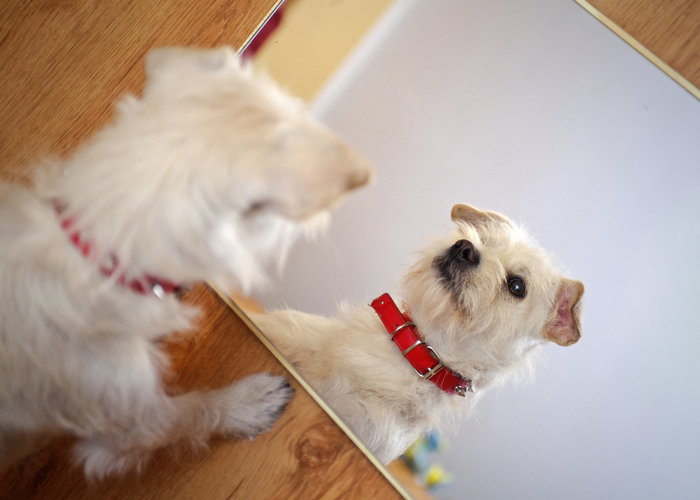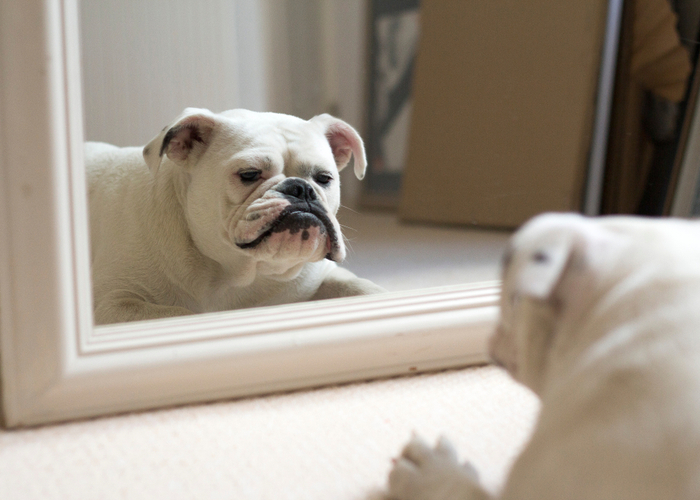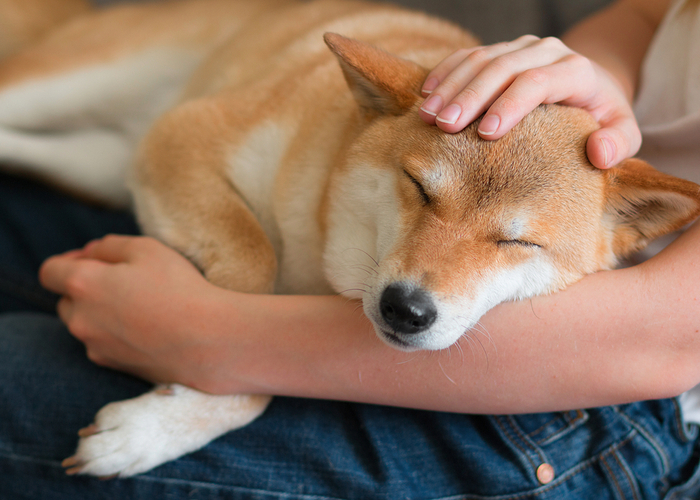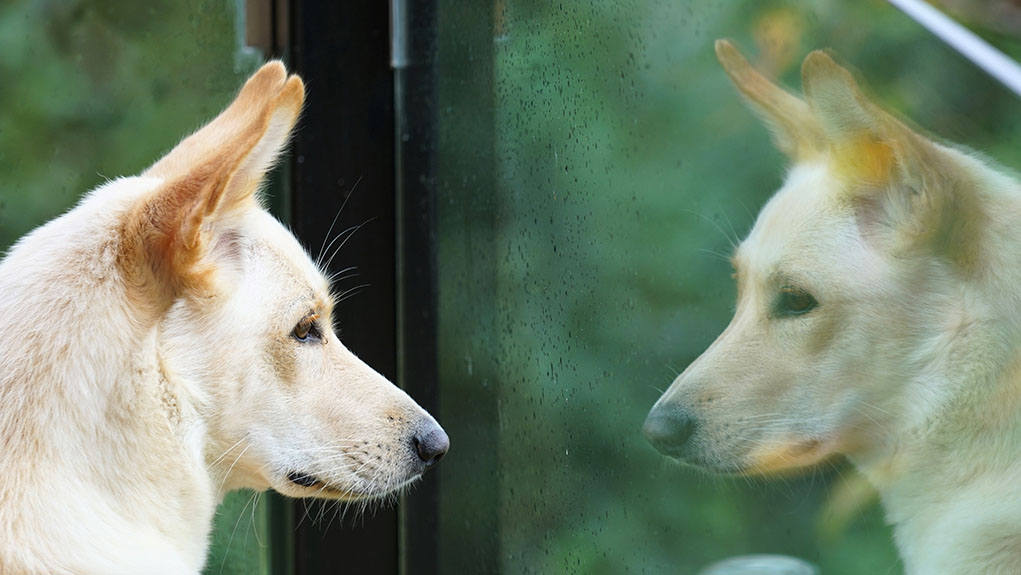Table of Contents
If you're a dog parent you might notice that your pup sometimes mirrors your personality. Now, you may be wondering, do dogs act like their owners?
Well, the short answer is yes, they do. Dog personalities are linked to their human personality.
Animal behavior researchers say that dogs know what we're putting down. They can feel when things are tense at home, or when their humans are sad. And now, they often take on elements of human personalities too.

Do Dogs Act Like Their Owners: Dogs Mirror Owner's Personalities
Now let's discuss, do dogs act like their owners? The short answer is yes.
Michigan State University researchers have discovered that dogs often copy the same personality traits as their owners. Their study shows that dogs are just like us humans, with personalities that are shaped over time.
“When humans go through big changes in life, their personality traits can change. We found that this also happens with dogs – and to a surprisingly large degree,” according to the research lead author and social psychologist at MSU, Professor William Chopik.
“We expected the dogs’ personalities to be fairly stable because they don’t have the wild lifestyle changes humans do, but they actually change a lot”.
He also added that they have discovered similarities to their owners, the optimal time for training, and even a time in their lives when they can be more aggressive toward other animals or pets.
In addition, Chopik also states that dog personalities can predict a lot of important life outcomes. For instance, the dog's personality will influence how close they feel to their owners, biting behavior, and even chronic illness.
In their research, they surveyed owners of around 1,600 dogs, with 50 different dog breeds. The dogs' ages ranged from a few weeks old to 15 years, and they were split closely between male and female dogs.
The owners were asked to evaluate their dog's personalities and to answer different kinds of questions about the dog's behavioral history. Also, the owners were asked about their personalities.
Three Main Correlations Found
According to the survey, they have found connections in three main areas which were:
- Age and Personality
- Human-to-dog personality similarities
- The relationship between the dog and owner influences the dog's personality
According to Chopik, “Older dogs are much harder to train; we found that the ‘sweet spot’ for teaching a dog obedience is around the age of six when it outgrows its excitable puppy stage but before it’s too set in its ways.”
Extroverted people evaluated their dogs as more excitable and active while owners who have more negative emotions rated their dogs to be fearful and less responsive to training.
On the other hand, people who rated themselves agreeable rated their dog as being less fearful and less aggressive toward people and other animals.
According to Professor Chopik, there are activities that we can do with dogs, that we can't do with people. For instance, obedience classes and training.
According to Chopik, “Exposure to obedience classes was associated with more positive personality traits across the dog’s lifespan. This gives us exciting opportunities to examine why personality changes in all sorts of animals.”
Does the Breed matter?
According to the study, they were unable to spot any meaningful findings connected to the dog's breed.
In a recent study, it was found that dog behavioral tendencies are distinct and are connected to their DNA.
However, as we stated above, they surveyed around 50 different dog breeds. They found that purebred dogs were most likely to be less fearful and aggressive.
In addition, female dogs and dogs that were spayed or neutered were also less likely to be fearful and display aggressive behaviors. But dogs that are prone to aggressive traits will rarely completely outgrow them.
But no matter the dog's breed, obedience classes, and proper training can go a long way when it comes to helping a dog's personality.
“We found that dogs that were exposed to some training or obedience classes were less aggressive, less fearful and more active, excitable and responsive to training,” Chopik added.
All in all, dogs are complex animals that share a unique bond with their humans. Every dog has their own unique personality.
But these personalities can change through the years and with life-changing events, and they can even mirror the personality of their owners.
The Connection Between a Dog's Personality and Trainability
The research also shows that dogs with specific traits are easier to train than others. For example, active and happy dogs are easier to train than fearful or anxious dogs.
It is also worth noticing that age is a factor when it comes to their training capabilities. Puppyhood and middle age is still the best time for training.
If a dog is a bit older, it will be harder to maintain their attention as they're set in their old ways.
On the other hand, their personality can also have an impact on their overall health. For instance, active dogs have a lesser chance of developing chronic diseases like hip dysplasia, blindness, deafness, and arthritis.
According to Chopik, “Activity and excitability are probably correlated with BMI, and there’s a lot of weight-related complications if your dog is overweight… it puts strain on their body, and that’s probably a bad thing.”

Habits that Your Dog is Picking Up From You
Yes, dogs do act like their owners. But what are those habits that they copy from us?
If you and your dog have been living together for quite a while now, you might notice that there are certain habits that your dog is picking up.
When they see you act a certain way, they often attempt to mimic this behavior to be more involved and feel like they are part of the family.
A few examples of these are:
Sleep Schedule
Naturally, dogs sleep way more than us humans. They sleep during the day, nap a little bit during the afternoon, and sleep at the same time as you at night.
For plenty of animals, instinctually, sleep is all about safety. When they don't feel safe or vulnerable, they'll be hesitant to get sleep.
That's why when they see their owners sleeping during the night, it is a sign that the environment is safe enough to let their guards down.
Your dog will realize and adjust their sleeping schedule while you're promoting comfort and security. So, if you're the type of owner that loves to stay up late, it is most likely that your pup will adjust to the same schedule.
Also, domesticated dogs have flexible sleep schedules. It is also possible that they'll adjust their sleep schedule to spend more time with as much as possible (Yup, we really do not deserve dogs).
How many hours do dogs sleep?
Generally, most dogs sleep at least 12 hours in a 24-hour period. They may copy your sleep schedule, but they do sure sleep a lot more than us.
You can help give your pup a goodnight's sleep with regular activities and stimulations. Also, regular vet checkups and a healthy diet are great aids.
Always make sure that they have a safe and comfortable environment. Try buying high-quality dog beds with a removable cover.
Eating Time
Just like your sleep pattern, your pup can also mimic your eating schedule. When you feed your dog at the same time you eat your meals, they'll most likely start to get hungry at that eating schedule.
If your dogs want to eat at the same schedule as you, this is perfectly a normal reaction. Dogs act like their owners because it makes them feel more involved and feels more part of the family.
Recommended Feeding Schedule for an Adult Dog
An adult dog is recommended to be fed at least twice a day. Feeding should be spread out evenly throughout the day and be at the same time each day.
Experts say that it is best to feed your dog twice a day, 12 hours apart. For instance, if you feed your dog at 7 am (before you leave for work) and 7 pm (your dinner time).
Mood
Since dogs act like their owners, they tend to also copy their moods.
If you're a dog owner, you've probably experienced this once or twice. Let's say you're feeling sad, then here comes our dogs trying to lift our spirits up, comforting us through our emotional moments.
However, dogs can also try to mirror our moods. For instance, if you're in an energetic or active mood, most dogs will happily copy this with enthusiasm. They'll be running around trying to play games with you.
On the other hand, if you're feeling a bit lazy and just want to sit around all day, most dogs will do the same. After all, they also love napping.

Frequently Asked Questions About Dogs Acting Like Their Owners
Why do dogs copy their owners?
You may have heard by now that dogs are pack animals. As part of the pack, they will try to copy their owners to fit into the group.
They'll behave the way their owners are behaving. They learn this by observing and imitating. However, even though they are copycats, they only mimic behaviors that they feel like useful to them.
Do dogs pick up on the owner's stress?
As we've discussed earlier, dogs can mirror your behavior and mood. For instance, if you're feeling stressed, then the dog is likely to copy that stress.
Dogs are very observant creatures. They can sense that something is wrong through our body language—from the way we move, posture, and even our facial expressions.
They can also detect stress through the tone of our voices. Since they have much better hearing than us, they can identify if your tone is happy, sad, stressed, or anxious.
Do dogs know when you're laughing at them?
Yes! They can tell when you're laughing at them. Since dogs are very sensitive to the tone of your voice, they will sense an enjoyable scene and will start to “play bow” in front of you.
If you're relaxed and having a good laugh, they'll wag their tails and tilt their heads to get a better appreciation of the laughter. But keep in mind they also know how to distinguish the difference between light-hearted laughter and a mocking one.
On the other hand, some dog breeds like the Cairn Terrier love to perform. They will show you different comical tricks just to make you happy and make you laugh.
How do you tell if a dog loves you?
There are plenty of indicators to know if your pup loves you back. Here are a few signs which can tell you if they love you:
- They love to sleep beside you
- Your dog looks at you with loving eyes
- They put you first more than food
- They give you presents from time to time
- Your dog is happy to see you (jump and bark when they see you)
- Your pup follows you around

Do Dogs Act Like Their Owners Summary
In conclusion, do dogs act like their owners? Definitely! Dogs tend to copy their owners to feel more involved. They'll copy your behaviors and personality to fit into their new family.
According to research conducted at the Michigan State University, dogs do copy the same personality traits as their human. But just like humans, dog personalities can still change or be shaped over time.
Their study shows that if you're an extroverted type of person, your pup will most likely be more active.
Then, if you're the type of person who is more agreeable, your dog will most likely become less fearful and less aggressive towards other people and pets.
On the other hand, owners that tend to have more negative emotions on display tend to have their dogs more fearful and less responsive to training.
There are still other habits that your dog is picking up from you. These can be your sleeping pattern, your meal schedule, and again, your mood.
Dogs love to copy your sleeping schedule since they feel safer beside you. Also, they'll do anything just to spend more time with you during the day.
There are some dogs that will cheer you up when you're feeling down, and some, unfortunately, copy these emotions and will most likely copy your stress or sadness.













